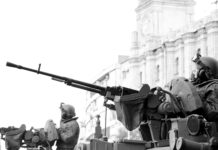While much of the world’s focus on the conflicts currently being waged in Europe and the Middle East, following Russia’s invasion of Ukraine and Israel’s war on Gaza. These conflicts have pushed much of the world’s focus away from the current conflict in Sudan and the devastating effects it has had on the Sudanese people.
The war which has been raging on for around two years at this point has seen thousands of deaths and millions of Sudanese people being displaced. A major humanitarian crisis has emerged within Sudan as a result of the war. There has even been growing alarm being raised about a potential genocide taking place in the Wester Darfur region in Sudan.
However, despite the dire situation in Sudan, news on the conflict fails to receive that much attention by international media outlets. Similarly, the war is hardly discussed on social media. While there have been protests on college campus in many Western nations around the war calling for an end to the war in Gaza, such attention so far hasn’t been afforded towards the Sudanese people
Omar al-Bashir
Sudan had been formally ruled by the government of President Omar al-Bashir for 30 years until he had been overthrown in a coup. Omar al-Bashir had taken over Sudan in 1989 after he had led a coup against the Sudanese regime at the time. During his rule, he turned Sudan into a one party state, controlled by his National Congress Party (NCP) with him at the helm.
However, his rule would finally come to an end in 2019 after many months and of nationwide protests by the Sudanese youth, due to the country’s dire economic conditions. Omar al-Bashir would however refuse to step down and had security forces crack down on the protester movement, however it hadn’t deterred protesters.
Eventually Omar al-Bashir would be overthrown in a coup by the military which saw al-Bashir being arrested by the military.
Post-Coup Sudan
The overthrow of the President hadn’t brought an immediate end to the nationwide protests. Protesters had continued to gather in favour of greater reforms to the country’s political system and sought greater democratic reforms in the country.
The protest would eventually come to an end after an agreement had been reached between protests and a transitional military council. The expectation was that eventually the military would step aside and democratically held elections would be held in Sudan. However, those hopes of a democratic future in Sudan would be undermined by military forces within the country.
Joint Rule
Rather than transitions towards democratic government being advanced, the military sought to maintain its grip on power. However, disputes between the governing military factions had increased as time had passed.
The bad-blood between the Sudanese military and the Rapid Support Forces (a powerful paramilitary force) had reached its boiling point until all out war broke out between the two sides.
Caught in the middle of the war have been the Sudanese people. Unlike in other civil war conflicts where factions of the general population side with one side or the other, try Sudanese people have largely not been aligned with either side. Meaning, this war has largely only been between the two warring factions, with the Sudanese people caught in the middle.
Humanitarian crisis
A major humanitarian crisis has hit the country as a result of the war. It has been described as the world’s worst displacement crisis as around 8.2 million people have reportedly been displaced by the conflict
Alarms of potential famine have been raised. People have reportedly been forced to eat things like grass in order to survive. Reports of sexual violence, mass killings and much worse have been coming out of Sudan over the last few months.
Mass killings have been reported in areas currently controlled by the Rapid Support Forces. Recently, the United Nations has warned about a potential genocide taking place in the Western Darfur region.
Foreign influences
As is the norm in most conflicts around the war at this point, foreign influences have played a major role in this conflict. A report leaked by the United Nations had claimed it had “credible” evidence that the United Arab Emirate has been providing military support to the Rapid Support Forces, however, the UAE has denied the claim.
This war has been devasting for the people of Sudan. It’s sad to see the amount of suffering experience by the peopllf of Sudnan, who had already experienced a brtual civil war against South Sudan and a genocide in the Western Darfur region, druing the presidency of Omar al-Bashir. What
What is perhaps even more sad is to see how African nations have largely sat back and done almost nothing to bring an end to the fighting. Even worse, some of Sudan’s neighbouring countries have attempted to prevent any Sudanese refuges from attempting to arrive in their naton to seek refuge.
So far ceasfire negotions have largely been led by the United States and Gulf nations, not African nations. One has to wonder why have our African leader failed in taking the lead to stop the fighting? Why has the situation managed to get so bad? When presumable the African continent is supposed to have forums in the African Union aimed at preventing this kind of violence.











